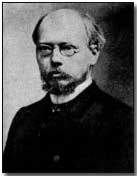Primary Documents - Count Georg von Hertling on the Fourteen Points, 24 January 1918
 Reproduced below is a
summary of
Count Georg von Hertling's
speech to the German Reichstag on 24 January 1918 on the subject of the
Fourteen Points. Count Hertling was appointed German Chancellor
following the resignation of
Theobald von Bethmann-Hollweg
and served as essentially a puppet leader acting under direction of the
military high command led by
Paul von Hindenburg and
Erich
Ludendorff.
Reproduced below is a
summary of
Count Georg von Hertling's
speech to the German Reichstag on 24 January 1918 on the subject of the
Fourteen Points. Count Hertling was appointed German Chancellor
following the resignation of
Theobald von Bethmann-Hollweg
and served as essentially a puppet leader acting under direction of the
military high command led by
Paul von Hindenburg and
Erich
Ludendorff.
In his 8 January 1918 speech to the U.S. Congress President Woodrow Wilson essentially unveiled the terms under which America would accept a negotiated peace settlement; these quickly became known as the Fourteen Points.
Hertling's initial reaction to Wilson's speech was on the whole conciliatory, indicating a willingness (albeit with caveats) to negotiate for peace along the lines outlined by the U.S. President.
Click here to read an extract from Wilson's 11 February 1918 speech to Congress designed to clarify U.S. intentions regarding the Fourteen Points. Click here to read Count Hertling's reaction to Wilson's 11 February speech. Click here to read British Foreign Secretary Arthur Balfour's reaction. Click here to read Belgian Prime Minister Charles de Broqueville's views regarding any peace settlement.
Summary of Count Hertling's Speech to the Reichstag, 24 January 1918
(1) The negotiations at Brest-Litovsk prove "that we are quite ready to accept this proposal [President Wilson's first point, on no secret international agreements] and declare publicity of negotiations to be a general political principle."
(2) There is "no difference of opinion" with Mr. Wilson in respect to his second point, on freedom of the seas; but to realize this it would be well if the fortifications at Gibraltar, Malta, Aden, Hong-Kong, and other places should be removed.
(3) The Central Powers are "in thorough accord with the removal of economic barriers which interfere with trade in a superfluous manner" and "condemn economic war."
(4) "The idea of limitation of armaments is entirely discussable."
(5) As to colonies, "Mr. Wilson's principles will encounter some difficulties in the realm of reality," but the "reconstitution of the world's colonial possessions" will "have to be discussed in due time."
(6) In respect to evacuation of Russian territory, "we are dealing with questions which concern only Russia and the four allied [Central] Powers."
(7) "The Belgian question belongs to those questions the details of which are to be settled by war and peace negotiations (Kriegs und Friedensverhandlungen)."
(8) "The integrity of our territory [including Alsace] offers the only possible basis of peace discussion. The occupied parts of France are a valuable pawn in our hands; forcible annexation forms no part of the official German policy."
(9 to 12) Mr. Wilson's points 9 to 12 touch chiefly Austria and Turkey.
(13) "It may be left to Germany, Austria-Hungary, and Poland to come to an agreement on the future constitution" of Poland.
(14) The German Government "is gladly ready, when all other pending questions have been settled, to begin the examination of the basis of... a bond of nations."
Source: Source Records of the Great War, Vol. VI, ed. Charles F. Horne, National Alumni 1923
A Battery was a group of six guns or howitzers.
- Did you know?
